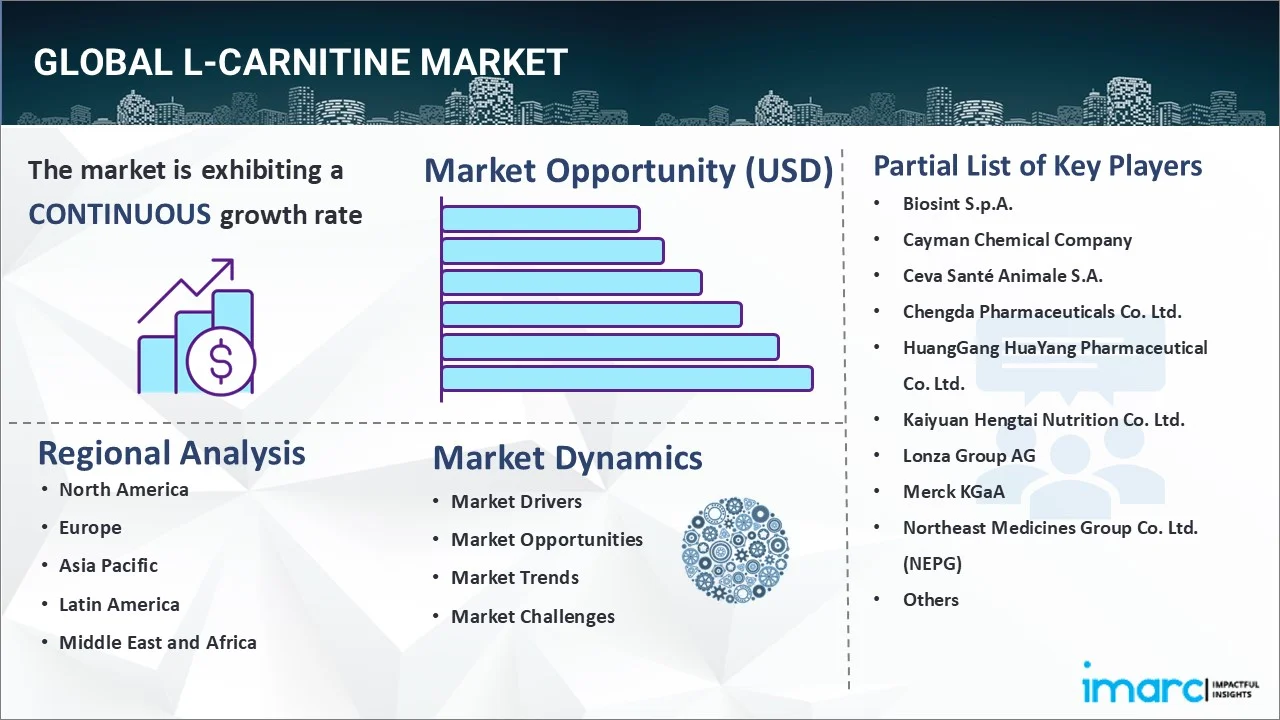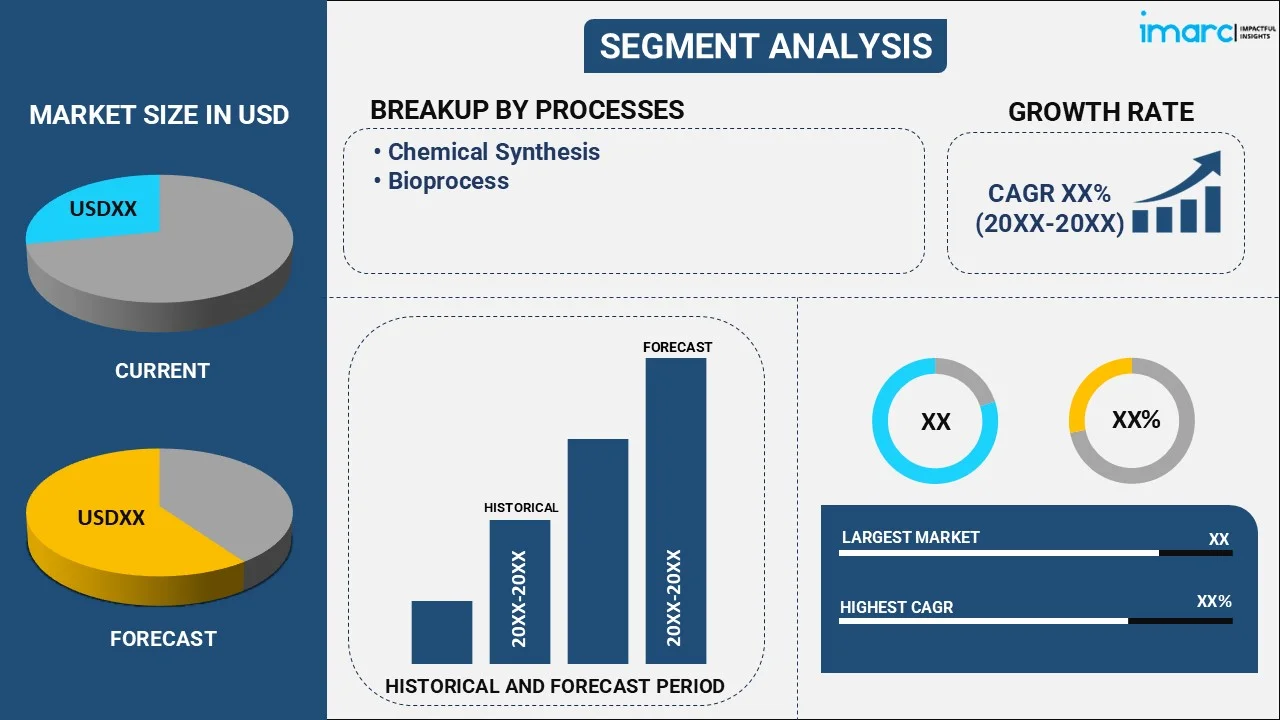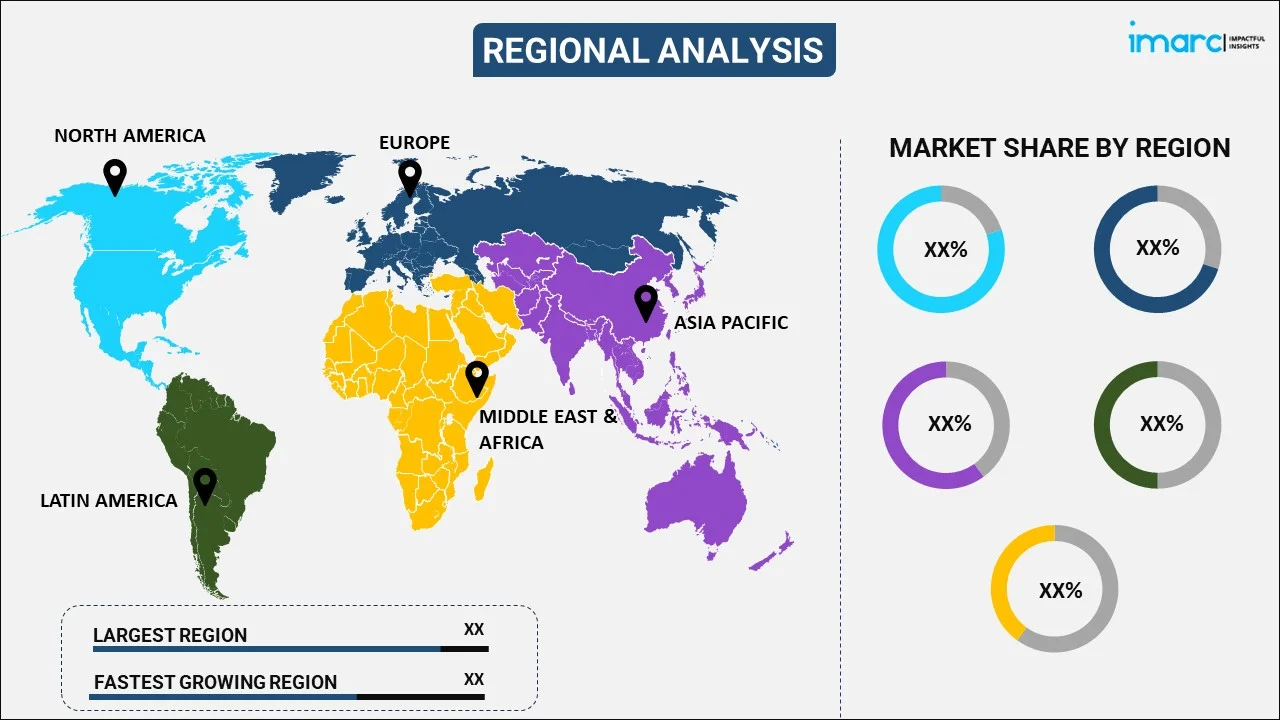
L-Carnitine Market Report by Process (Chemical Synthesis, Bioprocess), Product (Food and Pharma Grade, Feed Grade), Application (Animal Feed, Healthcare Products, Functional Food and Beverage, Medicines), and Region 2025-2033
Market Overview:
The global L-carnitine market size reached USD 220.1 Million in 2024. Looking forward, IMARC Group expects the market to reach USD 337.1 Million by 2033, exhibiting a growth rate (CAGR) of 4.46% during 2025-2033. The growing awareness about health and fitness and the need to achieve fitness goals among individuals, rising demand for weight management products, and thriving sports nutrition industry are some of the major factors propelling the market.
|
Report Attribute
|
Key Statistics
|
|---|---|
|
Base Year
|
2024 |
|
Forecast Years
|
2025-2033
|
|
Historical Years
|
2019-2024
|
| Market Size in 2024 | USD 220.1 Million |
| Market Forecast in 2033 | USD 337.1 Million |
| Market Growth Rate 2025-2033 | 4.46% |
L-carnitine is a naturally occurring compound that has an essential role in the metabolism of fatty acids, specifically in the transportation of long-chain fatty acids into the mitochondria of cells. It facilitates the transport of fatty acids into these organelles, where they undergo oxidation to produce energy. It is synthesized in the body and can also be obtained through various dietary sources, such as meat, fish, and dairy products. As it is utilized as a dietary supplement to support weight management and athletic performance, the demand for L- carnitine is increasing across the globe.

At present, the rising demand for L-carnitine among sports people to improve their productivity is contributing to the growth of the market. In line with this, the increasing adoption of L- carnitine among the geriatric population to improve mitochondrial function and energy metabolism is strengthening the growth of the market. Apart from this, the growing demand for L-carnitine due to the rising prevalence of chronic diseases, such as cardiovascular diseases, diabetes, and neurodegenerative disorders, among the masses around the world, is positively influencing the market. In addition, the increasing adoption of vegan products due to changing consumer dietary patterns is offering lucrative growth opportunities to industry investors. Furthermore, the wide availability of L-carnitine products through online and offline distribution channels across the globe is supporting the growth of the market.
L-Carnitine Market Trends/Drivers:
Rising awareness about health and fitness among individuals
There is a rise in the demand for L-carnitine due to the increasing awareness about the importance of health and fitness among the masses around the world. People are becoming more health-conscious and are focusing on products that assist in maintaining their health. In addition, they are increasingly preferring dietary supplements that can support overall well-being and fitness goals. Apart from this, L-carnitine plays an important role in fat metabolism and assists in energy production. It is rapidly gaining popularity, as it aids in weight management and enhancing athletic performance. Consumers are adopting L-carnitine supplements to enhance their physical performance and optimize energy levels, which is positively influencing the market.
Thriving sports nutrition industry
There is a rise in the adoption of L-carnitine products due to the thriving sports nutrition industry. In addition, the growing demand for L-carnitine on account of the increasing number of athletes, fitness enthusiasts, and health-conscious individuals around the world is contributing to the growth of the market. L-carnitine benefits in enhancing athletic performance, reducing exercise-induced muscle damage, and supporting post-workout recovery. Athletes and fitness enthusiasts are incorporating L-carnitine supplements into their training methods to optimize their energy utilization, endurance, and recovery, which is offering a positive market outlook.
Growing demand for weight management products
People are increasingly preferring weight management products due to the rising prevalence of obesity cases among them. In line with this, they are actively seeking solutions for weight management to control their weight and maintain a healthy lifestyle. L-carnitine is a popular ingredient in weight management products that plays an essential role in energy production in the body. Apart from this, there is a wide availability of L-carnitine-based formulations and supplements that claim to support fat burning and weight loss. In addition, the rising adoption of these supplements due to their convenience and accessibility across the globe is positively influencing the market.
L-Carnitine Industry Segmentation:
IMARC Group provides an analysis of the key trends in each segment of the global L-carnitine market report, along with forecasts at the global, regional, and country levels from 2025-2033. Our report has categorized the market based on process, product, and application.
Breakup by Process:

- Chemical Synthesis
- Bioprocess
Bioprocess represents the largest market segment
The report has provided a detailed breakup and analysis of the market based on the process. This includes chemical synthesis and bioprocess. According to the report, bioprocess represented the largest segment. Bioprocess, also known as microbial fermentation, comprises using microorganisms, such as bacteria or yeast, to produce L-carnitine. In this method, microorganisms are genetically engineered to biosynthesize L-carnitine naturally. Besides this, the rising adoption of bioprocess to produce L-carnitine, as it is a more environmentally friendly and sustainable way, is contributing to the growth of the market. In addition, the increasing consumer preferences for eco-friendly products are bolstering the growth of the market.
Chemical synthesis refers to the traditional method of producing L-carnitine through chemical reactions in a laboratory setting. In addition, chemical synthesis process involves materials, such as trimethylamine and butyrobetaine, which undergo several chemical steps to produce L-carnitine. Apart from this, the chemical synthesis process is well-established and widely used for the production of L-carnitine products across the globe.
Breakup by Product:
- Food and Pharma Grade
- Feed Grade
Food and pharma grade accounts for the majority of the market share
The report has provided a detailed breakup and analysis of the market based on the product. This includes food and pharma grade and feed grade. According to the report, food and pharma grade represented the largest segment. Food and pharma grade L-carnitine is primarily used in the food and pharmaceutical industries. In the food industry, it is commonly incorporated into functional foods, beverages, and dietary supplements to cater to the specific needs of health-conscious consumers. In addition, the rising adoption of L-carnitine food and beverage products among individuals to support their fitness and overall well-being is propelling the growth of the market. On the other hand, L-carnitine is used in the pharmaceutical industry for the formulation of drugs and supplements with specific health benefits.
Feed grade L-carnitine is used in animal nutrition, particularly in livestock and pet food. It serves as a nutritional supplement to enhance the energy metabolism and overall health of animals. Apart from this, the rising utilization of feed-grade L-carnitine to support the growth, development, and performance of livestock and companion animals is strengthening the growth of the market.
Breakup by Application:
- Animal Feed
- Healthcare Products
- Functional Food and Beverage
- Medicines
Healthcare products holds the biggest market share
The report has provided a detailed breakup and analysis of the market based on the application. This includes animal feed, healthcare products, functional food and beverage, and medicines. According to the report, healthcare products represented the largest segment. L-carnitine is widely used in healthcare products, such as dietary supplements, pharmaceuticals, and nutraceuticals. In line with this, L-carnitine is popular among individuals seeking weight management and improving athletic performance and general well-being. In the pharmaceutical industry, L-carnitine is incorporated into formulations targeting specific medical conditions where its metabolic properties offer potential benefits.
The animal feed industry utilizes L-carnitine as a feed additive to enhance the nutritional value of livestock and pet food. L-carnitine is employed in animal diets to support energy metabolism, improve growth performance, and enhance overall health in various species, such as poultry, swine, cattle, and companion animals.
The functional food and beverage (F&B) sector incorporates L-carnitine into various products to provide additional health benefits as compared to basic nutrition. Functional foods and beverages with L-carnitine assist in supporting energy metabolism, weight management, and fitness among individuals.
Breakup by Region:

- North America
- United States
- Canada
- Europe
- Germany
- France
- United Kingdom
- Italy
- Spain
- Others
- Asia Pacific
- China
- Japan
- India
- South Korea
- Australia
- Indonesia
- Others
- Latin America
- Brazil
- Mexico
- Others
- Middle East and Africa
North America exhibits a clear dominance, accounting for the largest L-carnitine market share
The report has also provided a comprehensive analysis of all the major regional markets, which include North America (the United States and Canada); Europe (Germany, France, the United Kingdom, Italy, Spain, and others); Asia Pacific (China, Japan, India, South Korea, Australia, Indonesia, and others); Latin America (Brazil, Mexico, and others); and the Middle East and Africa.
North America held the biggest market share due to the increasing consumer focus on health and wellness. In line with this, the rising adoption of dietary supplements and functional foods that promote fitness is bolstering the growth of the market in the region. Apart from this, the increasing demand for L-carnitine as a feed additive to improve animal nutrition and performance is contributing to the growth of the market. In addition, the rising utilization of L-carnitine due to the presence of several key manufacturers in the region is supporting the growth of the market.
Competitive Landscape:
Key players are continuously focusing on developing innovative formulations and delivery methods to cater to diverse consumer preferences. This includes creating new L-Carnitine-based products, such as effervescent tablets, gummies, liquid drops, and powders. Apart from this, major manufacturers are focusing on uncovering new applications and potential benefits of L-carnitine in various industries, such as pharmaceuticals and functional foods. In line with this, they are promoting L-carnitine products by organizing campaigns and educating consumers about the potential health benefits of products. In addition, companies are ensuring product quality and safety by adhering to industry standards and regulations to maintain product credibility. Furthermore, companies are engaging in partnerships with research institutions and universities to improve product offerings.
The report has provided a comprehensive analysis of the competitive landscape in the market. Detailed profiles of all major companies have also been provided. Some of the key players in the market include:
- Biosint S.p.A.
- Cayman Chemical Company
- Ceva Santé Animale S.A.
- Chengda Pharmaceuticals Co. Ltd.
- HuangGang HuaYang Pharmaceutical Co. Ltd.
- Kaiyuan Hengtai Nutrition Co. Ltd.
- Lonza Group AG
- Merck KGaA
- Northeast Medicines Group Co. Ltd. (NEPG)
- Tokyo Chemical Industry (India) Pvt. Ltd.
L-carnitine Market Report Scope:
| Report Features | Details |
|---|---|
| Base Year of the Analysis | 2024 |
| Historical Period | 2019-2024 |
| Forecast Period | 2025-2033 |
| Units | Million USD |
| Scope of the Report | Exploration of Historical and Forecast Trends, Industry Catalysts and Challenges, Segment-Wise Historical and Predictive Market Assessment:
|
| Processes Covered | Chemical Synthesis, Bioprocess |
| Products Covered | Food and Pharma Grade, Feed Grade |
| Applications Covered | Animal Feed, Healthcare Products, Functional Food and Beverage, Medicines |
| Regions Covered | Asia Pacific, Europe, North America, Latin America, Middle East and Africa |
| Countries Covered | United States, Canada, Germany, France, United Kingdom, Italy, Spain, China, Japan, India, South Korea, Australia, Indonesia, Brazil, Mexico |
| Companies Covered | Biosint S.p.A., Cayman Chemical Company, Ceva Santé Animale S.A., Chengda Pharmaceuticals Co. Ltd., HuangGang HuaYang Pharmaceutical Co. Ltd., Kaiyuan Hengtai Nutrition Co. Ltd., Lonza Group AG, Merck KGaA, Northeast Medicines Group Co. Ltd. (NEPG), Tokyo Chemical Industry (India) Pvt. Ltd., etc. |
| Customization Scope | 10% Free Customization |
| Post-Sale Analyst Support | 10-12 Weeks |
| Delivery Format | PDF and Excel through Email (We can also provide the editable version of the report in PPT/Word format on special request) |
Key Questions Answered in This Report:
- How has the global L-carnitine market performed so far, and how will it perform in the coming years?
- What are the drivers, restraints, and opportunities in the global L-carnitine market?
- What is the impact of each driver, restraint, and opportunity on the global L-carnitine market?
- What are the key regional markets?
- Which countries represent the most attractive L-carnitine market?
- What is the breakup of the market based on the process?
- Which is the most attractive process in the L-carnitine market?
- What is the breakup of the market based on the product?
- Which is the most attractive product in the L-carnitine market?
- What is the breakup of the market based on the application?
- Which is the most attractive application in the L-carnitine market?
- What is the competitive structure of the global L-carnitine market?
- Who are the key players/companies in the global L-carnitine market?
Key Benefits for Stakeholders:
- IMARC’s report offers a comprehensive quantitative analysis of various market segments, historical and current market trends, market forecasts, and dynamics of the L-carnitine market from 2019-2033.
- The research study provides the latest information on the market drivers, challenges, and opportunities in the global L-carnitine market.
- The study maps the leading, as well as the fastest-growing, regional markets. It further enables stakeholders to identify the key country-level markets within each region.
- Porter's five forces analysis assist stakeholders in assessing the impact of new entrants, competitive rivalry, supplier power, buyer power, and the threat of substitution. It helps stakeholders to analyze the level of competition within the L-carnitine industry and its attractiveness.
- Competitive landscape allows stakeholders to understand their competitive environment and provides an insight into the current positions of key players in the market.
Need more help?
- Speak to our experienced analysts for insights on the current market scenarios.
- Include additional segments and countries to customize the report as per your requirement.
- Gain an unparalleled competitive advantage in your domain by understanding how to utilize the report and positively impacting your operations and revenue.
- For further assistance, please connect with our analysts.
 Request Customization
Request Customization
 Speak to an Analyst
Speak to an Analyst
 Request Brochure
Request Brochure
 Inquire Before Buying
Inquire Before Buying




.webp)




.webp)












